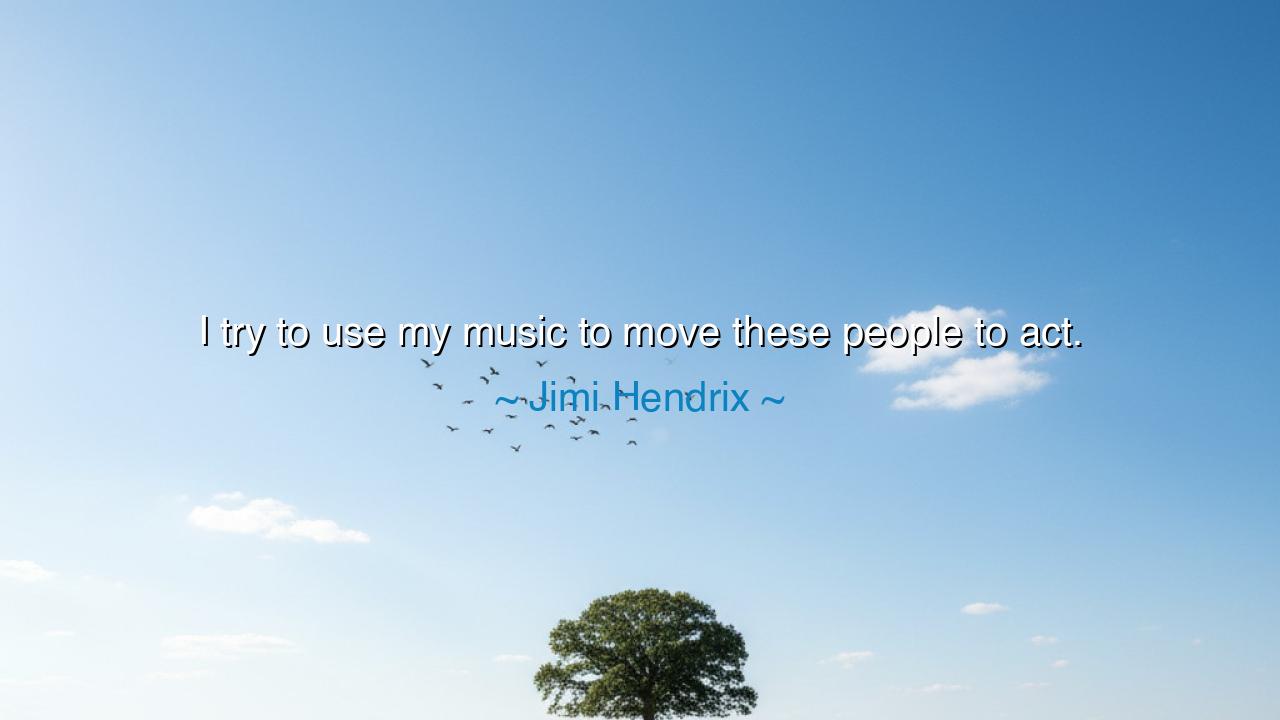
I try to use my music to move these people to act.






The words of Jimi Hendrix — “I try to use my music to move these people to act.” — are the cry of a prophet clothed in the garments of a musician. They reveal the ancient truth that music is not merely for delight, not merely for entertainment, but for transformation. Hendrix confesses that the purpose of his sound was never to leave people unmoved, but to stir their hearts so deeply that they would rise from passivity into action. For sound that only soothes is half a song; the true song is that which awakens the soul to live differently.
The ancients knew this power. In Greece, the bards sang not simply to entertain, but to instruct, to rouse courage, to stir patriotism. Tyrtaeus, the Spartan poet, composed verses that inflamed soldiers before battle, turning fear into valor. His words were music married to rhythm, and they moved men to act, to take up arms and defend their land. In the same way, Hendrix saw his guitar not as a toy, but as a weapon of spirit, able to shake listeners from their slumber and draw them toward truth, protest, and freedom.
In his own time, Hendrix’s music rose amid the storms of the 1960s — a world aflame with war, civil rights struggles, and cries for liberation. To play softly was not enough; the world demanded a sound that could cut through chaos. His performance of “The Star-Spangled Banner” at Woodstock was not a mere interpretation of an anthem, but a reimagining — his guitar howling like bombs, wailing like sirens, reflecting the pain of his generation. In that moment, he embodied his words: using music to move people, to open their eyes to the realities of their world.
Consider also the example of Martin Luther King Jr., who though not a musician, understood the rhythm of speech as music. His sermons and speeches flowed with cadence and harmony, rising and falling like hymns, and because of that, they stirred multitudes to act. Hendrix’s words reveal a similar conviction: that truth spoken plainly is often ignored, but truth sung or played with passion pierces the heart, bypassing defenses, and compels action.
Yet Hendrix’s confession also carries a warning. For to wield music in this way is to take upon oneself a great burden. The artist who seeks not only to entertain but to awaken must suffer the weight of misunderstanding, opposition, and struggle. History is filled with such figures — Beethoven, who poured his defiance of fate into symphonies that stirred generations; Bob Dylan, whose songs became weapons of protest; and Hendrix himself, whose every note bore both beauty and urgency. To seek to move people is noble, but it demands courage, for not all wish to be awakened.
The lesson is clear: let your gifts, whatever they may be, serve not only yourself but others. Do not use your art, your work, or your voice for vanity alone. Like Hendrix, let them become instruments of movement, stirring others toward justice, compassion, and truth. If you paint, paint to open eyes. If you speak, speak to awaken hearts. If you live, live in such a way that your very presence moves others to greater action.
Practical action lies before us: ask yourself each day, does my work move anyone? Does it change even a single life? If the answer is yes, then you walk in the footsteps of Hendrix, wielding your craft as a force of transformation. If the answer is no, then perhaps it is time to look inward and rediscover the deeper power within your gifts. For every person is given a voice, and every voice can stir others to act.
Thus, O seeker, remember Hendrix’s words: “I try to use my music to move these people to act.” May you also use your gifts to awaken, to stir, and to ignite. For in the end, it is not enough to create beauty; the highest calling is to create change. Let your song — whatever form it takes — be one that moves the world.






AAdministratorAdministrator
Welcome, honored guests. Please leave a comment, we will respond soon